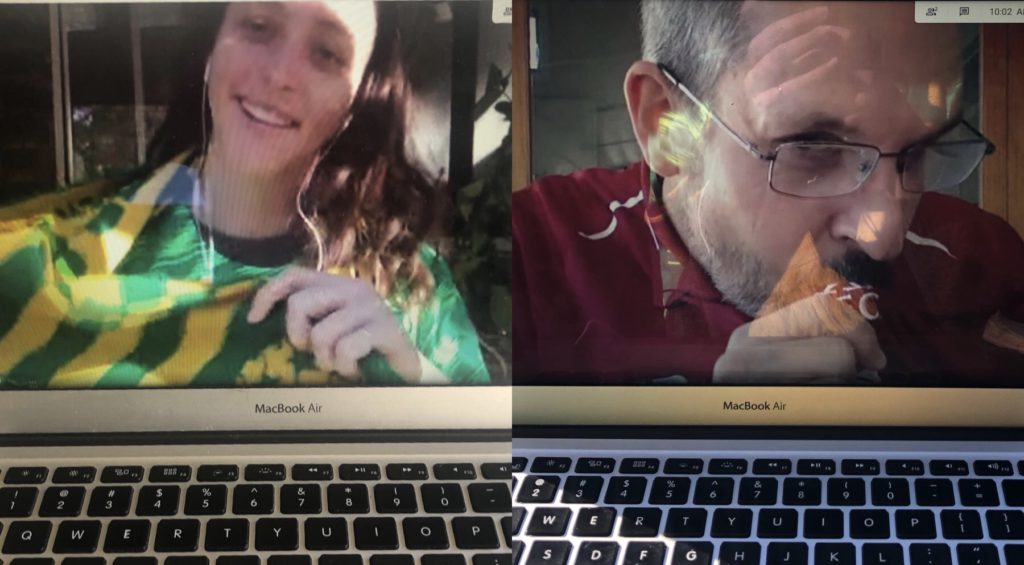Leaders are constantly looking for new sources of inspiration that their organisations can benefit from. What are others doing that we can implement to make a real, positive difference? How do we deliver on our purpose?
With some industries like financial services and aged care suffering identity crises after scathing royal commissions, and organisations like AMP struggling to break free of a ‘win at all cost’ mentality, maybe it’s time to look elsewhere for our cultural leadership?
When I look for inspiration in these confronting times, I’m finding it in unexpected places. One example is the world of football. And before I go on, I must confess that I am something of a football (aka soccer) tragic. Jurgen’s Reds, Ange’s Roar, Gus’ golden generation Socceroos, and Stajcic’s Matildas have all given me hours of joy. I’m a coach myself with 15 years’ experience. This season it’s Under 16 Youth Premier League in Brisbane. My nephew is my assistant coach and both my kids play, which is awesome.
For diehard Reds (aka Liverpool) fans, 2020 has been quite a year. After 30 years without a league title they finally delivered, even overcoming a three month delay due to the coronavirus pandemic. Add to that the 2019 Champions’ League, World Club Cup and Super Cup titles and it’s been a season to remember.
What made Liverpool’s Premier League win extra special for me was that the title was secured within a few hours of the FIFA announcement that Australia and New Zealand will host the 2023 World Cup for Women. The final icing on the cake was that I got to share the associated euphoria with my new work colleague Issy who, as an NPLW player, understands the significance of such achievements. The main photo is us on the morning of 25 June! And just to be clear, Issy is an Everton fan so I appreciate her indulging me on this!

Bart coaching the Newmarket boys
So what can organisations learn from a football club like Liverpool as they navigate the challenges of 2020?
For me football is much more than a game. It’s a microcosm of many things that are important in business, society and life in general… results, strategy, tactics, culture and leadership. While Liverpool’s football has been amazing, there are other clubs, like Manchester City, who can lay claim to playing an even more impressive style. What makes it so special for me to be a Reds fan right now is how their cultural blueprint is so strongly aligned with my core values: respect, collaboration, fun and teamwork. Not just getting results, but doing it in a way that makes you deeply proud to be a fan.
So let’s unpack… What is it about Liverpool FC that organisations can learn from?
-
Recruit for more than skills
Like any organisation, Liverpool’s recruitment efforts have certain constraints, including financial, which they’ve turned into a positive by being more selective. Since Jurgen Klopp was appointed head coach in 2015, Liverpool have recruited for character, capability, future potential and a willingness to buy-in to the club’s style of play. As a result LFC has been able to foster a culture that no-one is bigger than the team. While many players have become stars since arriving at Liverpool, none of the current squad were established stars before they joined. This season Liverpool had 4 of the top 7 players in the world in the 2019 Ballon D’Or voting, the most prestigious award for footballers globally.
Far too often in business we recruit people who are highly skilled in a technical sense, without consideration for their personal values or cultural drivers. We often discover later that these things are not aligned to the culture we are seeking to foster, and the appointment doesn’t work out.
-
Welcome new arrivals properly
When new recruits join Liverpool they receive a clear message from the club…
- “We recruited you because we believe in your character and your potential as a footballer.”
- “No matter what you’ve done in your career up to this point, we need you to go to a whole new level in your time here.”
- “This is what we need from you. We will give you the best possible support and advice to help you get there. Let’s maintain an open dialogue as we progress.”
Every player has a crystal-clear job description and is buddied up with another squad member who plays in the same position. This encourages healthy competition for places, complemented by a clear support structure. Players are motivated to improve each other, not just themselves.
No matter how well-intentioned a new starter is, their first few days and weeks set the tone for their tenure with an organisation. Giving them clear expectations, introducing them to your culture, and providing genuine support to deliver their best is a must if you want to realise a return on your investment.
-
Invest in genuine relationships
If you watch Liverpool coach Jurgen Klopp interact with his players, and his coaching team, you can see he has invested deeply in building a meaningful relationship with each individual. This has a flow-on effect to the players who are also a very close-knit group.
Where Klopp takes it even further is the relationships he has forged with the people of Liverpool. He took the time to understand their core values and he reflects them in the things he does with the local community and media.
Taking the time to really get to know the people in our organisation as ‘whole humans’ significantly increases the likelihood that they’ll go the extra mile when you need them to. Building relationships with your stakeholder communities is also a massive ingredient to sustainable success.
-
The importance of clarity of purpose
There are two catch cries that sum up Liverpool to a tee. In 2020 these mottos are reflected in everything they do. One is a club anthem for the ages, the other a 2018 marketing campaign that now looks like a stroke of genius. Together they represent a mix of timelessness and ‘right here, right now’. They tell the story of the rich history of the club. They are:
- ‘You’ll Never Walk Alone’ – the club’s anthem sung before every home game from the Gerry and the Pacemakers 1963 song of the same name
- ‘We are Liverpool, this means more’ – from the club’s marketing department and shirt sponsor New Balance in 2018.
I challenge you to watch these videos and not want to part of this organisation! Many fans of other clubs admit that they shed a tear watching these. Klopp himself has been amazed by the extent to which his players have bought in to the Liverpool vision, labelling them ‘mentality giants’ as they mix gutsy results with astonishing displays and impossible comebacks.
Whatever your organisation stands for, you need to be able to articulate it clearly and with passion. If you do, you’ll attract capable people who want to be part of the action. Everything builds from there.
-
Respect others in the system
One of Jurgen Klopp’s hallmarks as a leader is his respect for the game more broadly, and within that, for opposition coaches and players, and match officials. When Liverpool lose, Klopp makes a point of congratulating the other team and thanking officials. He remains objective and philosophical in his analysis of the game with the media.
He knows that with his team’s unerring commitment to the cause, and each other, results will go their way often enough to achieve the ultimate goal.
Organisations that people want to be part of play by the rules and consider the greater good of the industry they are part of, rather than taking a ‘win at all costs’ and ‘others be damned’ approach.
Summary
So in summary, businesses can learn from Liverpool FC, and their coach Jurgen Klopp, in five ways.
- Recruit for more than skills. If the people who come in are a culture fit and have potential, you can teach them what they need to know to deliver on the organisation’s purpose
- Welcome new arrivals with a challenge to do great things and provide them with the support they need to realise that over time
- Build genuine relationships with your people AND other key stakeholders like customers and community
- Articulate your purpose with clarity and passion both internally and to the market. This will attract the sort of people who want to be part of the action.
- For genuine, sustainable success, respect the broader system you are in and act in the greater good.
Which of these can your organisation learn from?
And remember, YNWA




